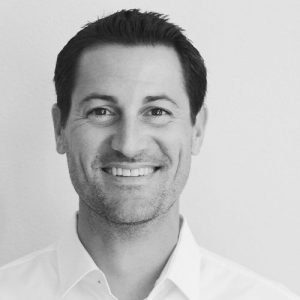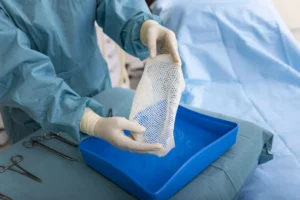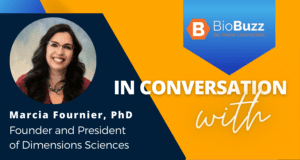
5 Questions With Katy Rommel, PhD, Director, Product Development, Kymanox
Katy Rommel, PhD, leads Product Development at Kymanox. Dr. Rommel has over a decade of expertise in R&D, Project Management, and Life Sciences.
| BioBuzz has been connecting the life science workforce since 2009. We’ve built an expansive community in the Mid-Atlantic with a national readership that spans from Massachusettes to Florida, and New York to California. For our next chapter, we’re building a proprietary talent logistics model to help employers source and hire life science talent. Learn more. |
1. What did you want to be when you grow up? How’d you get from there to here?
I entered college intending to be a veterinarian and I still think it’s a bit of a missed calling as I watch episodes of The Incredible Dr. Pol on weekends. My interest waned as I worked at a vet clinic in high school and college; there were too many basic vaccinations and untrained animals for me. Additionally, I realized that I had a hard time memorizing things like detailed anatomy and that vet school can be harder to get into than medical school.
Luckily, I had a great professor for Organic Chemistry and the flow of electrons just made sense in my brain. My professor convinced me to do an honors research project in his lab, add Chemistry as a second major, and apply to graduate school. I have always been one to go with the flow of opportunities that present themselves, I didn’t really have any selection criteria in mind when searching for graduate programs. Atlanta was my favorite place I lived as an Air Force brat, so I applied to Georgia Tech’s School of Chemistry and Biochemistry – and surprisingly, I got accepted.
I joined the lab of a new professor, studying how bacteria biosynthesize antibiotics. Unknowingly, this was my first foray into the startup environment; my research was interdisciplinary in nature, and we all had to wear multiple hats to keep the small lab running. After many difficult years, and tears shed in the back stairwell, I earned my degree. It was super fun to job search as a new grad after the great recession, but I ended up following a classmate to Silicon Valley to work for what has now become a case study of a diagnostic start-up.
It was an easy transition to work in an R&D assay development lab and be recognized for my work ethic. After a few years, things started to fall apart with the business, but I was able to adapt and become an integral part of the team that was trying to salvage something to create a product. The once siloed company full of inexperienced academics and sycophants was able to restructure and bring in experienced industry leaders who were excellent mentors. Even though the business didn’t survive, I gained such valuable skills and knowledge in those last two years by taking on stretch assignments, trying to fix past mistakes, and managing direct reports.
Ultimately, my husband and I decided that we didn’t want to try to buy a house in California and we moved back east, choosing the Raleigh-Durham, NC area for the relevant jobs and the perfect location in the south, right between the mountains and the sea. Have I mentioned that I hate job hunting? I went to a lot of local life science networking events and luckily met an entrepreneur to whom I explained that I like to do everything and be busy; he recommended I consider consulting at Kymanox. Initially, I didn’t realize that there was such a strong divide between the diagnostic and pharma industries, but my timing turned out to be perfect because pharma companies were starting to incorporate medical device and combination product requirements into their drug product development programs and Kymanox was taking off as a life science solutions provider. I have now been at Kymanox for over 5 years and have been working to build a strong team of confident and competent project leaders and expand our service areas.
2. How are you helping to build a more connected community?
This may be an embarrassing answer to the question, but I really struggle with engaging with the broader life science community. It’s easy to blame it on being an introvert, but I think I am just really bad at small talk; it takes a lot of energy to psych myself up to be outgoing around a lot of strangers. I have, however, recently gotten involved with mentoring young women interested in STEM and that is something I intend to continue in the future.
I also put significant effort into building up my mostly remote team and fostering a strong culture within Kymanox. I try to create opportunities for collaboration and encourage all of our team members to be engaged and visible, both with their clients and internally. For the past 2 years, I planned professional development workshops for when my team is together in person. I also believe in taking advantage of the easy opportunities that tend to get overlooked but don’t require much effort beyond sending a meeting invite – virtual mixers/coffee breaks and volun-telling people to present at team meetings.
3. What are currently buzzing about? Anything and everything…
I’m pretty boring, outside of work I try to keep up with everything I do at home (and fail), and then I turn my brain off.
My toddler daughter is starting to show interest in the potty, so that is an area of interest for me now too. Just in general, as a new-ish parent with no prior interest in children, you can probably always find an open article about child development on my phone.
4. If you could travel back in time – what early career advice would you give yourself?
The career advice I tend to emphasize to young people is the importance of knowing yourself – your strengths and weaknesses – in order to conduct yourself confidently around others. You don’t have to know all the answers, but be bold about what you do know and honest about the rest.
I think the most important moment of growth I had was developing self-assurance during grad school. I had a very strained relationship with my research advisor; I respected her immensely and she held a lot of control over my life, but I was never able to meet her expectations. Of course, I got through it and am stronger as a result, but I’m not sure the experience was fully necessary to learn the lessons I did. Ultimately, I was able to view the issue more objectively. I recognized how other respectable professors and colleagues viewed me and I was able to be less affected by the unfounded negativity; to quote a phrase I only learned a few years ago, “water off a duck’s back.”
5. FUN question. So (obviously) you’re in product development. What’s one product that doesn’t currently exist that should?
Oh man…the robot vacuum is great, but if there was something that could silently keep my house clean from top to bottom, that would be amazing.
- About the Author
- Latest Posts
BioBuzz is a community led, experience focused, biotech and life sciences media and events company. BioBuzz highlights regional breaking news, industry professionals, jobs, events, and resources for business and career growth. Their weekly newsletter is subscribed to by thousands in the BioHealth Capital Region and Greater Philadelphia as the go-to for industry updates.








